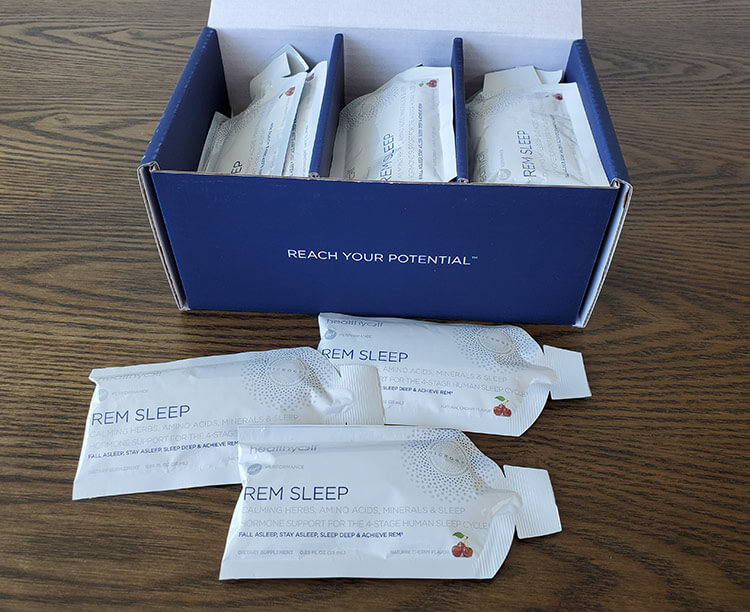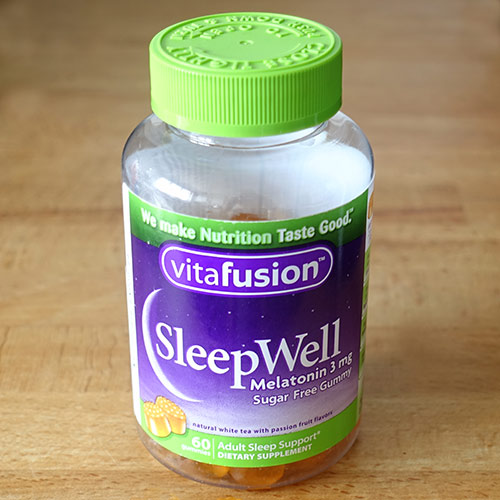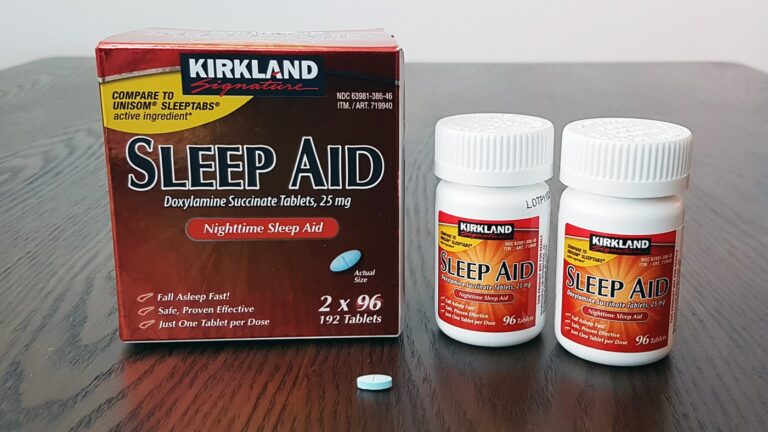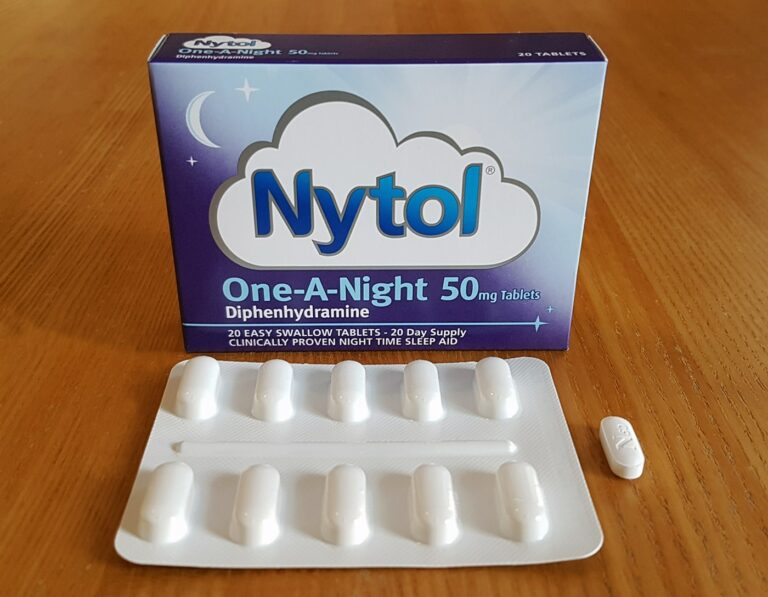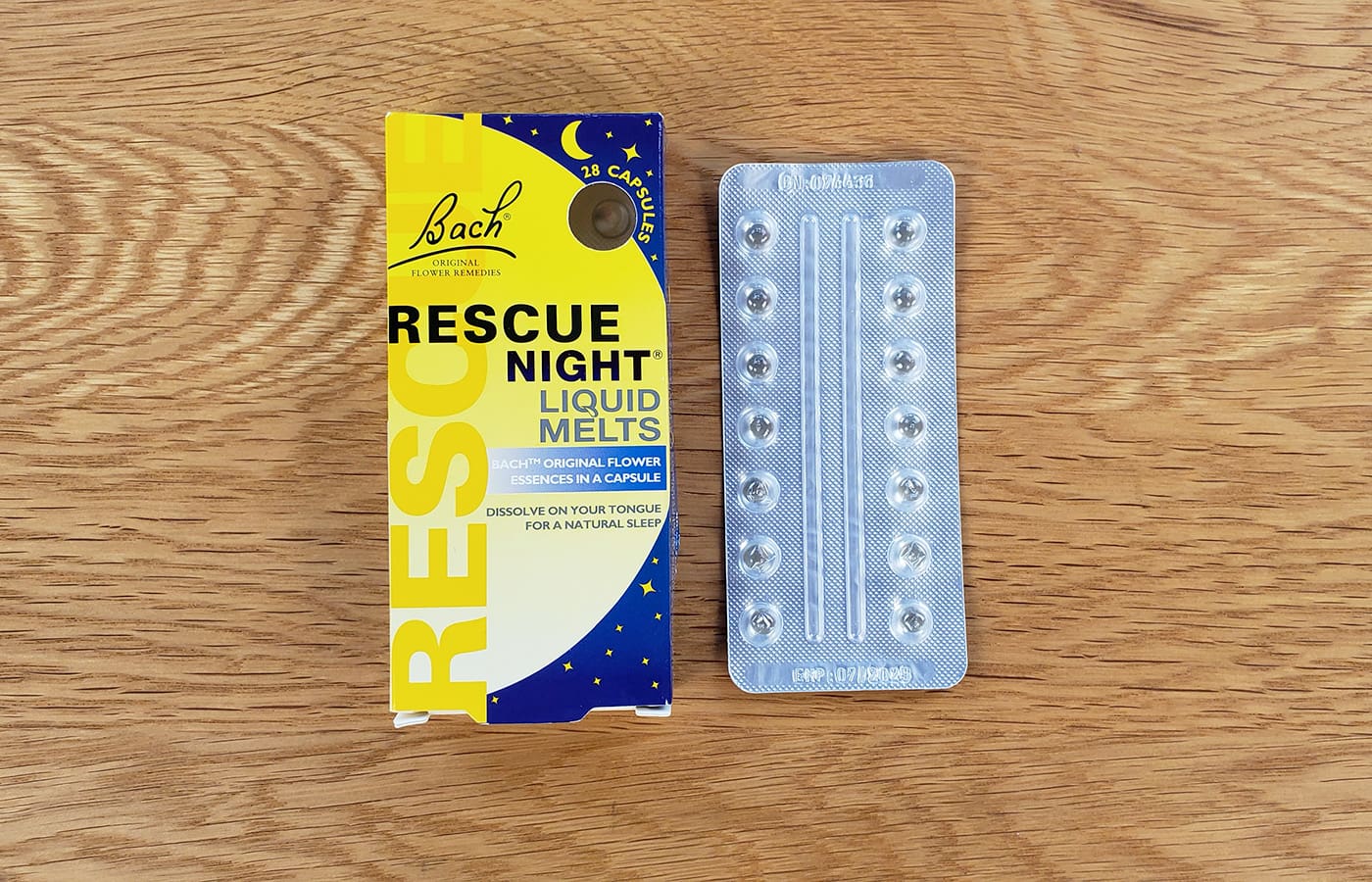
Disclosure: This review is based on my personal experience and you may have a different experience. Please discuss taking any new sleep aid with your doctor rather than only relying on online sources.
Updates: I first wrote this article in 2015, then updated it in 2022 when I tried Rescue Night again. In July 2024, I edited it to reflect changes in the websites I discuss.
I took Rescue Remedy Night liquid melts every night for a week to see if they would help me sleep better. I also took the standard Rescue Remedy for a week during the daytime to see what effect that version would have.
Bach’s Rescue Remedy is an alternative medicine that’s widely available in some countries. However, a review of placebo-controlled trials in 2010 found no evidence that it works better than a placebo (more on that later in the article).
Despite the lack of research evidence to back its efficacy, it’s produced on a commercial level and sold in many supermarkets and pharmacies here in the UK.
In this article, I’ll be describing my experience of taking the two versions of Rescue Remedy, and also when I came back to it seven years later. After that, I’ll look at what the research evidence says about Bach Flower Remedies, and how it’s supposed to work exactly.
My experience
Small capsules with no smell or taste
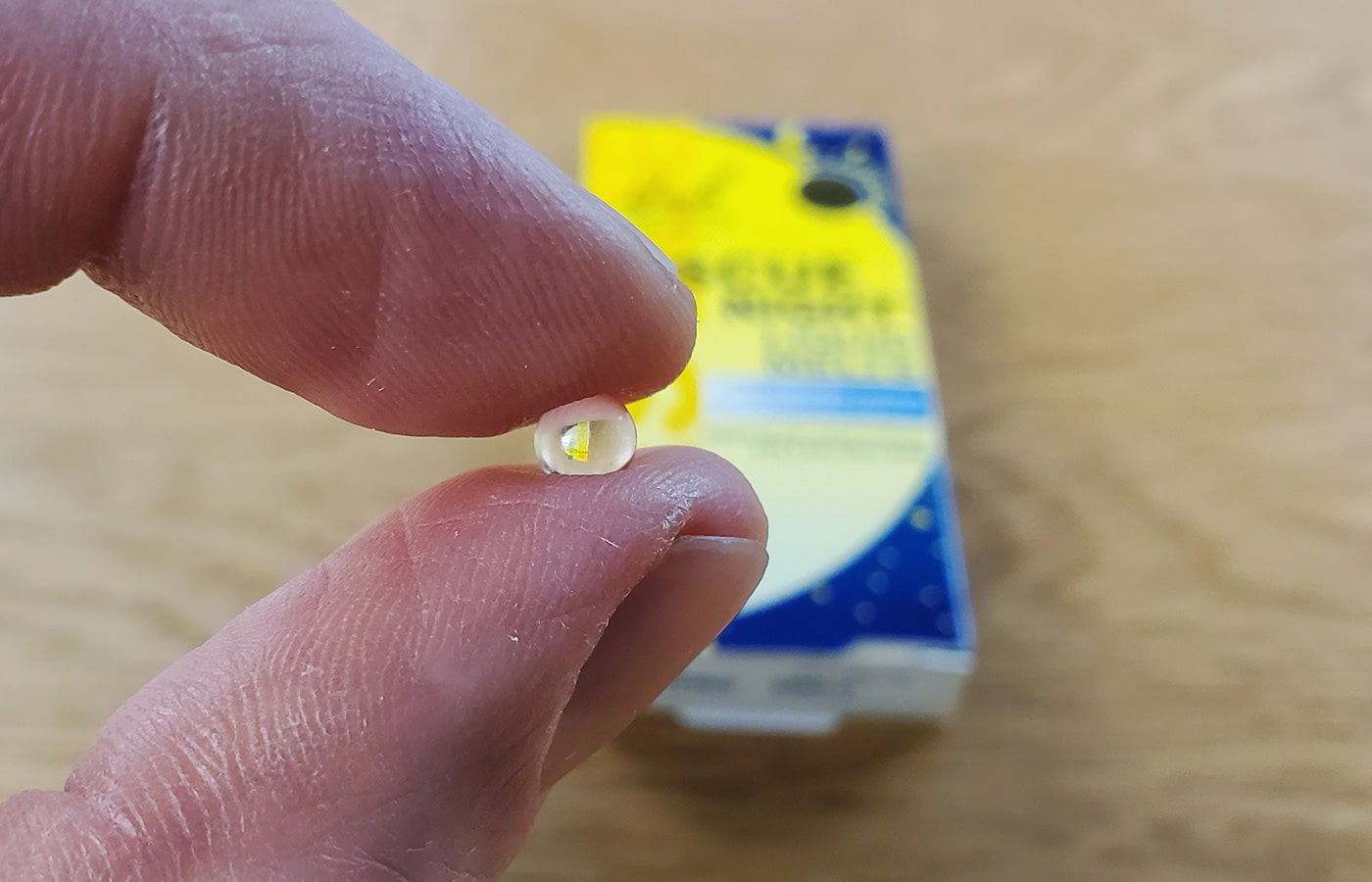
The first thing to note is that the Rescue Remedy Night capsules are tiny, as you can see in the photo above. They are easily dropped, so people with finger sensitivity issues might find them a bit awkward.
The capsules I took had no discernible smell or taste. Compared to over the counter sleep aids containing smelly valerian, such as Sominex Herbal, this was very welcome. I also prefer the bland taste to gummy sleep aids, like ZzzQuil Pure Zzzs, which have too much sugar for my liking.
I also like the fact that they dissolve on your tongue. Compared to some of the larger tablet sleep aids I’ve tried, this makes them easy to take. Other than the fiddly size, the Rescue Remedy Night capsules are convenient to take in comparison to many other sleep aids I’ve tried.
How I judge the effectiveness of sleep aids
I’ll be the first to admit that there is a lot of subjectivity in testing and writing about sleep aids. I can’t take them into a sleep clinic and borrow their gold standard testing equipment, so I’m left to my own observations, along with the data from my wearable sleep tracker.
I always keep a manual sleep diary, which I write notes in when I wake up. And for this particular test, I also used my Fitbit Versa’s sleep tracking to get an idea of how I slept.
At the end of the day though, it can be very difficult to determine whether a sleep aid actually works, whether the placebo effect played a part, or whether it worked better than you think but you just didn’t notice the subtle effects.
How I think I slept when taking Rescue Remedy Night
On the nights I took Rescue Remedy Night, I didn’t notice a significant improvement compared to how I was sleeping in the days leading up to taking it.
When I take a new sleep aid, I like to lie in bed reading for a good chunk of time (40 to 60 minutes) to see if I notice any drowsiness or other new sensations.
I didn’t feel particularly drowsy after taking the Rescue Remedy Night, and it certainly didn’t knock me out in the same way a strong pharmaceutical sleep aid might.
Having said that, I believe I slept reasonably well on four of the seven nights the week I took it, which made it a fairly normal week for me. It’s not the case that I slept well every night though, or that I fell asleep quickly after taking the Rescue Remedy Night.
As for my sleep tracker data, it showed the same results. Four nights were reasonably good, and the other three were slightly down on my nightly average over a longer period of time. The sleep tracker didn’t appear to show that I was falling asleep any faster than normal, or any faster than the previous week in which I didn’t take any sleep aids.
So the reality is that I can’t say either way whether it helped or not. I got the same amount of sleep as the week before, with no noticeable improvements that I could observe, and no change in my sleep tracker data that would suggest I was sleeping any better.
My thoughts on side effects
One good point about the Rescue Night is that I had no noticeable side effects. I often get side effects from antihistamine sleep aids, such as a fuzzy head in the morning, dry mouth, headache or vivid dreams.
I was pleased that I had no side effects from Rescue Remedy, as it can be a nuisance when you feel groggy in the morning after taking a sleep aid.
Stress levels
I can’t say I felt any less stressed in the first week I took the Rescue Night. No improved sense of calm appeared, and I continued to find the main factors in my life that had been stressing me out just as stressful.
Normal Rescue Remedy
After the first week, I decided to try
Once again, I can’t say that I noticed anything different though, either to my sleep or how stressed I felt.
Seven years later – a repeat test
I first wrote this article in 2015, and seven years later in 2022 I decided to buy another pack of Rescue Night to see if it would be any different.
Once again, however, they didn’t appear to make me feel sleepy, and didn’t help me feel any less stressed as far as I could tell.
My conclusion
Rescue Remedy appears to do nothing for me personally. I’ve tried the standard Rescue Remedy and Rescue Night twice, seven years apart, and had no results that suggest it was worth spending my money on.
That said, the fact that they are so easy to take and didn’t give me any side effects raises one interesting point: if you’re susceptible to the placebo effect, how bad is Rescue Night compared to stronger over the counter sleep aids?
In contrast to my experience, I’ve read accounts of people saying it helps on sites like Amazon. And I have a couple of friends who have tried to convince me I’m a cynical skeptic and that it does work.
So I’ll leave you to make your own mind up about Rescue Remedy, but stand by my personal opinion that there are more effective options out there for me.
What evidence is there that Rescue Remedy works?
In 2010, British researchers published a research paper reviewing clinical trials of Bach Flower Remedies. They analysed six placebo-controlled studies and found no support that it works, saying in their paper:
All placebo-controlled trials failed to demonstrate efficacy. It is concluded that the most reliable clinical trials do not show any differences between flower remedies and placebos.
Edzard Ernst
Furthermore, researchers in Austria came to a similar conclusion in their 2009 study, saying:
Most of the available evidence regarding the efficacy and safety of BFRs (Bach Flower Remedies) has a high risk of bias… Our analysis of the four controlled trials of BFRs for examination anxiety and ADHD indicates that there is no evidence of benefit compared with a placebo intervention.
Thaler et. al.
The same researchers also go on to conclude that the current evidence suggests Bach Flower Remedies are no more effective for psychological issues than a placebo, but are probably safe.
However, they caution that even this conclusion is made with “a high level of uncertainty” due to the lack of methodologically sound trials.
Why do so many people say it helps them?
With a lack of peer-reviewed research evidence that Rescue Remedy works, why is it that so many people say it helps them?
At the time of writing, there are 8,153 customer ratings on Amazon.com for the standard Rescue Remedy dropper, scoring an average of 4.5 out of 5 stars. 77% are five star ratings, and just 4% are one star. Some clearly love it, calling it “Absolutely amazing”, whereas others are distinctly less impressed, calling it “Snake oil”.
Interestingly, Rescue Night scores slightly less, with 4.2 out of 5 stars from 4,470 customer ratings. 8% gave it one star this time, so I wonder if people have higher expectations when it comes to their sleep rather than daytime use?
Some interesting positive comments are from people who found it helps their dogs. If a dog doesn’t know it’s getting a medicine, how can it be the placebo effect?
I spoke to a dog trainer to get his opinion about this. His view was that it’s likely the owner is transmitting their own placebo effect – the dog is likely to feel calmer when the owner is too.
Further information
Ingredients
Please note that the exact ingredients used may change over time.
The ingredients of the Rescue Night version that I described in my experience above were:
- Prunus cerasifera HPUS (Crab Apple)
- Clematis vitalba HPUS (Clematis)
- Impatiens glandulifera HPUS (Impatiens)
- Helianthemum nummularium HPUS (Rock Rose)
- Ornithogalum umbellatum HPUS (Star of Bethlehem)
- Aesculus hippocastanum HPUS (White Chestnut)
- Carnauba wax
- Coconut oil
- Gelatin (fish)
- Grapeseed oil
- Orange oil
- Natural vanilla flavor
- Pectin
- Sorbitol
The standard Rescue Remedy, which I took after my first week’s test of the Night version, contained the following ingredients:
- Impatiens glandulifera HPUS (Impatiens)
- Ornithogalum umbellatum HPUS (Star of Bethlehem)
- Prunus Cerasifera (Cherry Plum)
- Helianthemum nummularium HPUS (Rock Rose)
- Clematis vitalba HPUS (Clematis)
- 27% grape-based brandy
Note that the original Rescue Remedy and Rescue Night contain alcohol, but there are non-alcohol versions available now as well.
Listed possible side effects
When I bought mine, there was no information included about possible side effects to expect. Consult your doctor if you’d like a medical opinion about possible side effects, interactions, and warnings over who it wouldn’t be appropriate for.
What is Rescue Remedy?
Rescue Remedy is the most famous of many remedies sold under the brand Bach Flower Remedies. They were developed by Edward Bach, an English homeopath, in the 1930s.
If you search online, you’ll find more than one website that looks like it could be the official Bach Remedies website. To be honest, it’s so confusing, I’m not even sure if there is one official website or several!
When you look at one of the several websites which use the brand name Bach Remedies, you’ll find information about how the individual ingredients are supposed to help.
I’ve found some of the explanations to be quite esoteric. I consider myself to be fairly open-minded person, but I find some explanations lack a bit of substance, such as this excerpt for Cherry Plum on bachflower.com:
For those who fear losing control of their thoughts and actions and doing things they know are bad for them or which they consider wrong. Teaches trust in one’s spontaneous wisdom and the courage to follow one’s path.
This explanation left me wondering exactly how a Rescue Remedy capsule would ‘teach me to trust in my own wisdom’.
How exactly does Rescue Remedy work?
After reading about the individual ingredients, I needed to know more. Bachflower.com offers an interesting account:
The Bach Flower Remedies…gently restore the balance between mind and body by casting out negative emotions such as fear, worry, hatred and indecision which interfere with the equilibrium of the being as a whole. The Bach Flower Remedies allow peace and happiness to return to the sufferer so that the body is free to heal itself.
And that’s it. In the FAQ section, this is the full explanation for how Rescue Remedy works.
How Bach himself worked
To find out more, I turned to the Wikipedia entry and several other websites with articles about the origins of Bach’s flower remedies and how they work.
Here’s a curious quote explaining how Bach himself actually worked:
Rather than using research based on scientific methods, Bach derived his flower remedies intuitively and based on his perceived psychic connections to the plants. If Bach felt a negative emotion, he would hold his hand over different plants, and if one alleviated the emotion, he would ascribe the power to heal that emotional problem to that plant.
So the bottom line, apparently, is that Rescue Remedy works by transmitting the flower’s energy or vibrational nature to you. This positive energy can then help heal conditions which involve negative energy, such as anxiety or stress.
How Bach Remedies are made
One of the most useful sources of information I’ve found about Bach Flower Remedies is the official Bach Center in Mount Vernon, England. The center still exists in the place where the remedies used to be made in the past by Dr. Bach.
They explain how they used to make the Rescue Remedy at the center where they grow the plants, but demand outgrew capacity and they partnered with a company called Nelsons, which is now responsible for bottling. That’s also why some of the Bach websites selling the remedies online are run by Nelsons.
The Bach Center now focuses on education instead, and they have some interesting explanations for how Bach Remedies are made on the Bach Center website. They explain how there are two methods: the sun method and the boiling method.
Both involve transferring the plants’ energy to water using heat. The energised water is filtered to create a mother tincture, which is in turn diluted further to create the product that ends up in the customer’s hands.
If you’d like to learn more about the Remedies, perhaps take a look at their website. They have information about all 38 Bach Flower Remedies discovered by Dr. Bach. If you’re in the UK, you can even visit the center if you book in advance.
Final thoughts
My personal experience means I’m not totally convinced by Rescue Remedy, but I can see why it appeals to some people. The placebo effect can be powerful and I know some people prefer natural remedies. Supermarkets keep stocking it because people keep buying it.
However, it’s important to remember that there isn’t much evidence suggesting it works better than a placebo. And if you have concerns about your sleep or are considering trying new remedies, it’s always a good idea to consult with your doctor for professional advice.

